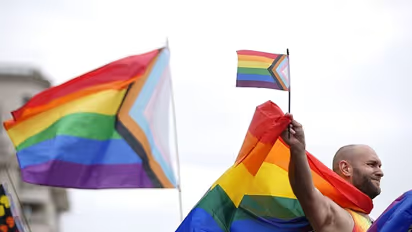New law in Hungary bans content in schools deemed to promote homosexuality

Synopsis
Prime Minister Viktor Orban, who is a hardline nationalist, faces an election and has grown increasingly radical on social policies, rallying against LGBT individuals and immigrants in his self-styled illiberal regime, which has deeply divided the country.
The Hungarian Parliament has passed legislation that bans the dissemination of content in schools deemed to promote homosexuality and gender change amidst criticism from human rights groups and the opposition parties in Hungary.
Prime Minister Viktor Orban, who is a hardline nationalist, faces an election and has grown increasingly radical on social policies, rallying against LGBT individuals and immigrants in his self-styled illiberal regime, which has deeply divided the country.
His Fidesz party promotes a Christian-conservative agenda, attached the proposal banning school talks on LGBT issues to a separately, widely-backed bill that strictly penalises paedophilia which makes it much harder for opponents to vote against it.
The move has been severely criticised as it conflates paedophilia with LGBT issues and triggered a mass rally outside the Parliament on Monday whilst several right groups have called on the party to withdraw the bill.
Fidesz lawmakers have backed the legislation on Tuesday whilst leftist parties boycotted the vote. Amendments submitted to the bill state that those under 18 cannot be shown any content that encourages gender change or homosexuality. This also applies to education and advertisements.
The bill decides a list of organisation that are allowed to provide sex educations in schools. The US Embassy in Budapest expressed deep concern over the anti-LGBTQI+ aspects of the bill and, in a statement on their website, said, "The United States stands for the idea that governments should promote freedom of expression and protect human rights, including the rights of members of the LGBTQI+ community."
Homosexual marriage is not recognised in Hungary, and only heterosexual couples can adopt children legally. Orban's government has redefined marriage as a union between one man and one woman in the Constitution and has put several limitations on gay adoption.
Parallels have been drawn between the bill and Russia's 2013 law that bans disseminating propaganda on non-traditional sexual relations by critics.
The ruling conservative party in Poland, Hungary's main ally in the European Union, has taken a similarly critical stance on LGBT issues.
European Parliament's rapporteur Gwendoline Delbos-Corfield said that using child protection as an excuse to target LGBTIQ people would be damaging to all children in the country.
In Hungary, Orban has won three elections consecutively, but a united opposition -- for the first time -- has caught up with Orban in opinion polls.